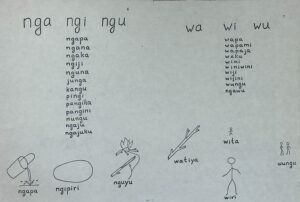
Pages 6 and 7 of “A Warlpiri Syllabary” by Ken Hale, 1974, Kenneth L. Hale Papers, MC-0523, Box 99. Department of Distinctive Collections, MIT Libraries, Cambridge, Massachusetts.
The MIT Libraries has received a Recordings at Risk grant from the Council on Library and Information Resources (CLIR) for a project to digitize endangered language recordings from the Kenneth L. Hale (1934-2001) papers. Hale was professor of linguistics at MIT from 1967 to 1999. In addition to being an ardent student of endangered languages, he was actively involved in causes promoting the preservation of Indigenous languages and cultures. This project seeks to digitize these recordings in order to enhance their description and enable their long-term preservation.
“This grant will ensure that examples of these endangered and extinct languages are preserved for future generations,” says Chris Bourg, director of MIT Libraries. “We’re grateful to CLIR for their recognition and support of this important project.”
Hale’s collection in MIT Libraries’ Distinctive Collections includes 702 open-reel audio tapes, audio cassettes, and VHS tapes of more than 80 distinct languages and dialects from around the world, predominantly Indigenous languages. The majority of the languages originate from the present-day southwest region of the United States, Mexico, and Australia. Donated to the MIT Libraries in 2003 by Hale’s wife, Sara (Sally) Hale, the tapes appear to be mostly field recordings, language lessons, and other documentation of the endangered languages that Hale studied, often recorded on his research trips. Hale’s recordings and field notes from the 1950s to the 1970s are well known for their accuracy and range and are considered invaluable for the communities now doing language restoration work and for future linguistic research in those languages.
“As we commit to the long-term preservation of the recordings, we also commit to pursuing this work in conversation with the featured language communities and experts in Indigenous collections and cultures,” says Emilie Songolo, head of MIT Libraries’ Distinctive Collections.
An advisory group will help MIT Libraries’ staff develop a thoughtful process for evaluating the recordings’ content and determining the corresponding access and use policies. The group includes Lydia Curliss, PhD Candidate, iSchool at the University of Maryland, member of the Nipmuc Tribal Community (Massachusetts); Ronald Geronimo, Director, O’odham Ñi’okĭ Ki: (O’odham Language Center), Tohono O’odham Community College; Nina Harris, Manager of Adaptable Resolution and Restorative Practices. MIT Institute Community and Equity Office; David Nash, Senior Lecturer, Australian National University; Norvin Richards, Professor of Linguistics, MIT; Kevin Scannell, Software developer and researcher focusing on technology for under-resourced languages; Jane Simpson, Emeritus Professor, Australian National University; Kimberly Toney, Coordinating Curator for Native American and Indigenous Collections, Brown University Library; and Ofelia Zepeda, Regents’ Professor of Tohono O’odham Language and Linguistics, University of Arizona.
MIT Libraries’ Distinctive Collections collects, preserves, and fosters the use of unique and rare materials such as tangible and digital archives, manuscripts, ephemera, artists’ books, and more. With these collections the Libraries seek to cultivate an interest in the past, present, and future; the humanistic and the scientific; and the physical and the digital in order to inspire and enable research, learning, experimentation, and play for a diverse community of users.
CLIR is an independent, nonprofit organization that forges strategies to enhance research, teaching, and learning environments in collaboration with libraries, cultural institutions, and communities of higher learning.

